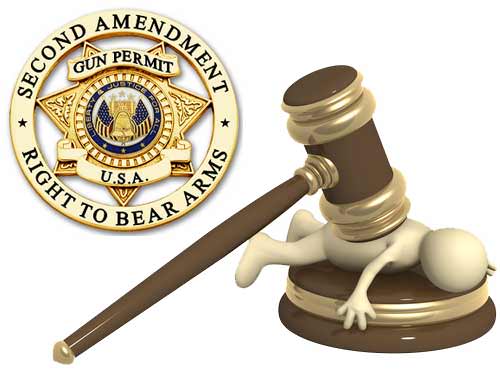By Paloma A. Capanna

New York – -(Ammoland.com)- On February 26, 2018, the Hon. Frank P. Geraci, Jr. of the Western District Court of New York released his Decision and Order in the federal civil rights case of Donna McKay vs. the State of New York.
The victory for those like Donna, who are falsely accused of having been “involuntarily committed,” is in the dismissal of her case. Victims of this systematic, false reporting by New York State to the FBI now have a clear course of legal action in county and federal courts to restore their Second Amendment and property rights.
Donna’s primary claim was filed under 18 USC §925A, alleging that the State failed to immediately correct the erroneous record it had filed to the FBI after she won a county court pistol license hearing.
The State, in its responsive papers, claimed it corrected the erroneous record after the federal lawsuit was filed. The State claimed the mistake was caused by the hospital, namely, Soldiers & Sailors Hospital (Penn Yan, NY).
In this watershed decision, Judge Geraci analyzed the claim under 18 USC §925A and gave the State a pass.
The decision hinged on the State’s claim that it latently took the necessary remedial action after the federal lawsuit was filed. (The State admitted it did not take corrective measures after Donna won the county license hearing that found no evidence that she had been “involuntarily committed.”)
McKay vs. NY thus creates the first precedent of its kind for victims of false “involuntary commitment” reporting made by NY or any other governmental entity. Judge Geraci specifically found “Section 925A thus provides a specific, equitable remedy for those denied a firearms transaction by a licensed importer, manufacturer, or dealer due to erroneous reporting by the State to NICS.”
In other words, Judge Geraci acknowledged the viability of a claim under 18 USC §925A to direct a governmental entity correct an erroneous record it submits to the FBI for NICS purposes. This puts the power squarely in the hands of the individual to compel the reporting government agency to answer claims by the individual of false government reporting in federal court.
The importance of this ruling cannot be overstated.
Until this decision in McKay vs. NY, individuals caught in the State’s zealous over-reporting of “involuntary commitment” could not obtain relief. The Catch-22 was this: an individual could win the county license hearing, but could not get the federal record corrected. This meant an individual could be cleared at the county and NYS level for the possession, use, and purchase of a firearm, but continue to be incorrectly listed as a “disqualified person” in the federal NICS system.
The erroneous listing as a “disqualified person” created two potential impacts. First, the individual would continue, wrongfully, to be denied a purchase of a firearm at an FFL. Second, the individual might be subject to wrongful arrest and property seizure by the FBI or ATF, if said agency relief upon the erroneous record in the federal database.
“Disqualified person” in this instance is defined at 18 USC §922(g)(4), which must be read with the implementing regulation found at 27 CFR §478.11.
The use, possession, or attempted purchase of a firearm if a “disqualified person” is a felony at federal law, punishable by up to ten years in federal prison and a fine of $125,000.
Donna’s pistol permit from New York was already restored through the successful county court hearing and decision. Following the release of this federal court decision, Donna’s handgun was been restored to her permit, and her background check as required for this process was approved.
No appeal needs be taken from the decision. What began more than three years ago in county court is now completed.
This article is the first part of a four-part blog series this week about the recent decision in McKay vs. New York.
- Federal court decision: McKay_Geraci 02262018 Decision
- County court decision: McKay 52 Misc3d 936 2016

About Paloma A. Capanna
Paloma is an Attorney and Policy Analyst with a focus on Second Amendment litigation, representing individuals, activist organizations, and FFLs. Paloma’s work spans individual handgun permit cases to federal civil rights litigation. A common theme among her cases is putting an end to government secrecy, whether the NICS-to-TSDB program by the FBI, the ISARS database of the NYS Police, or any number of Freedom of Information requests. Admitted to practice in New York in 1992, Paloma has more than 20 years of litigation experience at the trial and appellate levels.
